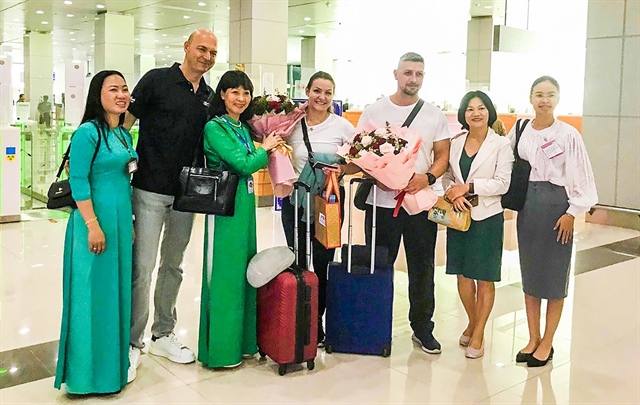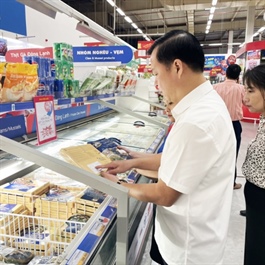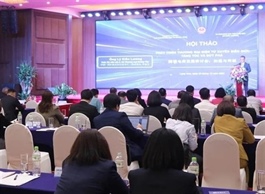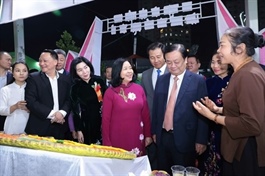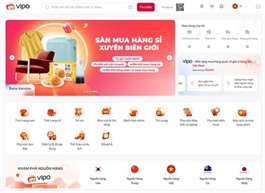Foreign travel platforms gain control of Vietnam’s online market
Foreign travel platforms gain control of Vietnam’s online market
Foreign online travel agents (OTA), such as Traveloka, Booking.com, and Agoda, are now dominating the Vietnamese online market.
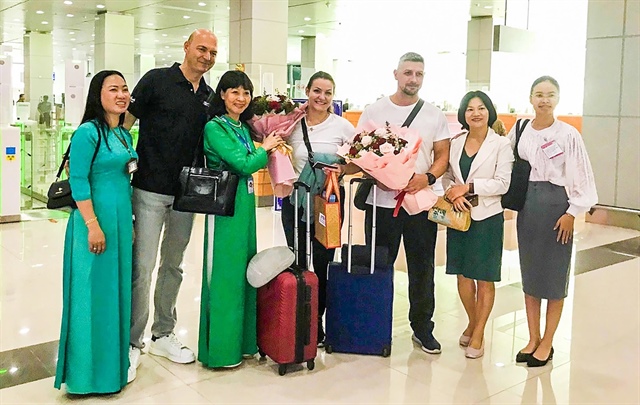
Leaders of the Kien Giang Investment, Trade, and Tourism Promotion Center welcome tourists from Czechia, October 24, 2024. Photo: T.Phuong / Tuoi Tre |
According to the Outbox Travel Tech 2024 survey, Vietnamese users strongly prefer Traveloka, Booking.com, and Agoda.
The study also revealed that the journey from platform awareness to completing a booking is significantly stronger for international platforms compared to local OTAs.
Notably, 82 percent of the respondents reported being familiar with Traveloka, and 61 percent had used the platform within the past 12 months.
Vietnam-based OTAs are typically branches of traditional travel companies or start-ups and receive limited funding, eventually withdrawing from the market after a short period of operation.
Hoang Duc Huy, CEO of Vitamin Tours Services Company Limited, confirmed that foreign OTAs are winning the competition.
Other experts echo the statement, pointing out three main reasons for their success: products, technology, and capital.
For products, foreign OTAs provide various services, including hotels, air tickets, tours, and insurance. They can negotiate for lower prices thanks to their global networks.
Foreign OTAs also allow diversified payment methods and according to Outbox, Vietnamese tourists prefer paying via bank transfers, cash, e-wallets, and credit/debit cards.
With technology, foreign OTA platforms enable customers to book air tickets, tours, airport transfers, and hotel rooms anywhere around the globe within minutes.
Their websites are available in clearly translated Vietnamese, and they have established local customer service centers.
In comparison, Vietnamese OTAs still complete many tasks manually, leading to long customer wait times.
An outstanding advantage of foreign OTAs is their financial potential, which helps them continuously have marketing campaigns and 'wholesale' bookings covering large quantities of rooms and airline tickets up to a year in advance and then flexibly adjust prices. This is under the strategy of using revenue from developed markets to compensate for emerging markets like Vietnam.
“With a large network of partners and suppliers, we can offer many options at competitive prices," Varun Grover, country head of Booking in Vietnam, told Tuoi Tre (Youth) newspaper
He forecast that the OTA market in Vietnam may reach US$9 billion by 2025 given an increase in the number of Internet users and their incomes.
“Local OTA will have to continuously renovate and improve their services to meet travelers’ demand,” Grover said.
Vietnamese OTAs seeking ways to develop
Dang Manh Phuoc, CEO of The Outbox Company, recognized that Vietnam’s OTA market has been dominated by foreign agents, including those from Asia.
|
|
| Many foreign OTAs dominate the online travel market in Vietnam. |
Over the past decade, local OTAs have experienced many ups and downs. They have been looking for new ways, such as focusing on niche markets or cooperating with international partners to survive due to the fierce competition.
A few success stories include Tripi, Mytour, VnTrip, Gotadi, iVIVU, Chudu24, and Luxstay that have launched and focused on improving their services.
Other local tourism companies decided to sell stakes to foreign OTAs interested in infrastructure, networks, and ways to operate in the domestic market, according to Hoang Duc Huy, CEO of Vitamin Tours Services Company Limited.
Tugo, a Vietnamese travel agent that entered the market to provide cheap yet quality tours, has shifted to highly promoted and high-end tours that focus on VIP clients in response to the fierce competition from international OTAs.
Huy from Vitamin Tours Services Company Limited claimed that domestic and foreign OTAs have to deal with customers shopping for the best deals, often comparing prices and promotional packages before making a decision.
"We should take inspiration from the resilience of the people in the Mekong Delta and their ability to live with the floods," Huy suggested.
Meanwhile, Phuoc from The Outbox Company noted that Booking.com operates without a local marketing or business department. Instead, it relies on a market development team dedicated to fostering relationships with suppliers.
In contrast, Asian-based OTAs like Traveloka, Trip, or Klook have subsidiaries in Vietnam to meet local needs and trends.
After the COVID-19 pandemic, new trends indicate that tourists will prefer to book services directly with suppliers.
As a result, large hotels have launched independent booking platforms to reduce dependence on, and commission for, OTAs.


